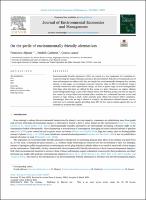| dc.contributor.author | Lanza, Gracia | |
| dc.date.accessioned | 2025-05-13T21:57:20Z | |
| dc.date.available | 2025-05-13T21:57:20Z | |
| dc.date.issued | 2024-03-06 | |
| dc.identifier.uri | https://repositorio.catie.ac.cr/handle/11554/12799 | |
| dc.description.abstract | Environmentally friendly alternatives (EFA) are touted as a key component of a transition towards lowering the impact of human activity on the environment. Still, the environmental costs of these technologies are seldom null; they are simply less environmentally damaging than existing options. In this paper, we investigate consumer behavior when an EFA is introduced. Using a carefully constructed field experimental design, we look at plastic bags vis-a-vis biodegradable (bio) bags, when the latter are offered for free versus at a price. Moreover, we explore offering costly biodegradable bags as part of the default choice. We find that giving away the bio bags for free results in a large behavioral rebound effect, resulting in a substantial increase in the total number of bags. Setting a small, rather symbolic price offsets this rebound effect completely. Interestingly, when the bio bag is offered as a default, the behavioral rebound remains. Our results lead us to conclude against providing these EFA for free and to caution against the use of subsidies to promote their uptake. | es_ES |
| dc.format.extent | 12 páginas | es_ES |
| dc.language.iso | en | es_ES |
| dc.publisher | Elsevier | es_ES |
| dc.relation.ispartof | Journal of Environmental Economics and Management | es_ES |
| dc.relation.uri | https://doi.org/10.1016/j.jeem.2024.102967 | |
| dc.subject | Plastic pollution | es_ES |
| dc.subject | Behavioral rebound effect | es_ES |
| dc.subject | Field experiment | es_ES |
| dc.subject.other | Sede Central | es_ES |
| dc.title | On the perils of environmentally friendly alternatives | es_ES |
| dc.type | Artículo | es_ES |
| dc.identifier.status | openAccess | es_ES |
| dc.subject.sdg | ODS 13 - Acción por el clima | es_ES |


